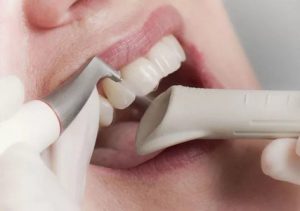Have your teeth become ugly yellowish in color and “decorated” with pigmented food or tobacco stains? Are you trying to eliminate plaque, restore the enamel to its natural whiteness, give your teeth smoothness and shine, and get rid of bad breath? Do you want professional toothbrushing to go in the most gentle and painless way? Your choice is Air Flow. What is this procedure and what are its features?
Click here : Dental Crowns in Dubai
What is Air Flow?
Air Flow technology was developed. It involves the use of finely divided soda powder in a mixture with water and air. The cleaning mixture from a special apparatus is applied to the teeth under pressure. It eliminates surface contamination and soft deposits from them that are not amenable to a conventional toothbrush, and also penetrates the most inaccessible places of the dentition, for example, into the interdental spaces.
Particles of abrasive powder are much smaller in comparison with crystals of household soda, therefore they do not have a traumatic effect on tooth enamel. The procedure will help you eliminate pigmentation from red wine, tea, coffee from your teeth, and also effectively remove superficial tobacco deposits. During the cleaning of Air Flow, a finely divided cleaning mixture acts on the tooth enamel. The Air Flow procedure is completely safe and does not cause any discomfort.
How is the Air Flow procedure
Preparatory stage
Your doctor will provide you with eye protection glasses and a cap to prevent dust from settling on your hair. A saliva ejector is placed under the tongue.
Cleaning up
The doctor alternately induces the tip of the device on the teeth and cleans the enamel from plaque and stains. The Air Flow device has two nozzles (for air and a water-abrasive mixture) and allows you to control the pressure of the jet, so the doctor can adjust the effect from gentle to maximum in problem areas. The cleaning agent spreads pointwise and does not enter the mucous membrane.
The final stage
According to your desire, after completion of the procedure, you can apply fluoride varnish, which will allow you to save the result longer, strengthen your teeth and protect them from caries. When cleaning Air Flow, not only pathogenic deposits are removed from the teeth, but also a natural protective film. Temporarily, the teeth become more vulnerable, so for several hours you should stop smoking, traumatic and coloring products: coffee, red wine, carbonated drinks.
Air Flow takes an average of about half an hour. It can be used both as a separate service, and to prepare for other procedures, for example, chemical bleaching, fluoridation, installation of braces. Your doctor may also recommend a procedure for a more accurate diagnosis: brushing your teeth with Air Flow will help him detect small foci of caries or damage to the enamel, invisible to soft deposits or tartar.
Benefits of Air Flow
Toothbrushing using Air Flow technology is a safe and effective method that gives you benefits such as:
- High-quality removal of plaque, tobacco yellowness, surface stains on enamel, as well as soft deposits (plaques) that have not yet had time to harden.
- Complete painlessness – the procedure does not give you any unpleasant sensations.
- Safety for teeth – the cleaning mixture consists of fine particles that cannot harm tooth enamel and do not contain aggressive chemicals.
- Polishing the surface of the teeth, which reduces the rate of plaque formation in the future.
- Excellent prevention of calculus and subgingival deposits.
- Unlike ultrasonic cleaning, Air Flow is suitable for cleaning prostheses and implants, and is safe for patients with pacemakers.
- All teeth are processed in one session, you do not need repeated visits to the hygienist.
- Due to its alkaline pH, Air Flow Detergent has an antibacterial effect, eliminating up to 100% of bacteria and endotoxins. You will get rid not only of plaque, but also of bad breath.
- It is suitable for preparing for the installation of braces, because, unlike traditional cleaning compositions, it does not contain glycerol and, therefore, does not reduce the strength of the brackets attached to enamel.
- Thanks to its directional effect, Air Flow carefully and safely eliminates plaque and deposits around braces.
Brushing Air Flow allows you to lighten your teeth by 1-2 tones
By eliminating stains and plaque, Air Flow returns its teeth a natural white color.
What Air Flow Can’t
As already mentioned, brushing your teeth with Air Flow does no harm to your teeth. However, it is not necessary to place unrealistic hopes on her.
- Brushing Air Flow does not whiten teeth, but only eliminates plaque that covers the enamel. Your teeth will regain their natural color, but may not be as white as you expected – after all, the color of enamel in people varies quite a lot. For bleaching, deeper-acting products are needed that brighten dentin. If you wish, you can also perform the procedure of professional whitening in the clinic “”.
- Air Flow does not remove calculus. She can only cope with soft deposits and plaque. Before using Air Flow, tartar must be removed using a mechanical method or ultrasound.
- The Air Flow procedure has a temporary effect. Although this procedure perfectly eliminates plaque and stains, over time they form again. Depending on the quality of oral hygiene, lifestyle and eating habits, this will take from several months to a year. Then the cleaning must be repeated.
With increased sensitivity of the teeth, the procedure can deliver discomfort. In this case, it is recommended to apply a local aerosol or application anesthetic or use powder with painkillers.
Are there any contraindications?
Toothbrushing with Air Flow is completely safe, but in some cases it is better to refuse. First of all, we are talking about periodontal diseases in the acute phase – in order to carry out the procedure, you must first stop the inflammatory process. In addition, Air Flow can exacerbate the condition in the presence of acute and chronic diseases of the respiratory tract (bronchitis, asthma).
Other contraindications for brushing your teeth with Air Flow:
- pregnancy and lactation;
- enamel thinned due to age-related reasons or increased abrasion ;
- deep caries (first treatment is necessary);
- age up to 12 years.
Learn more about the Air Flow procedure at a dentist and hygienist appointment at the Clinic during a routine check-up. Sign up to our highly qualified specialists – the initial consultation is completely free!
For more information visit our website Versailles Dental Clinic
 Bloggers Trend Keeping You Up To Date
Bloggers Trend Keeping You Up To Date

